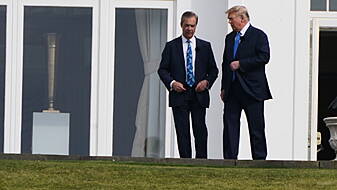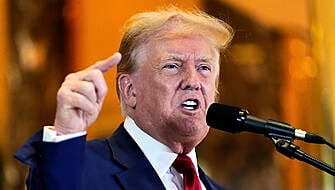One thing 2024 is sure to bring is political upheaval as we head into a year of elections that will include local and European elections, the 2024 US presidential election, and likely general elections in Ireland and the UK.
Here, we have a look at what's at stake in each of these elections, and the factors that may influence them.
European elections
The local and European Parliament elections will take place from June 6th to 9th, 2024.
Ireland currently has 13 MEPs. In June 2023, the European Parliament adopted a resolution to add an additional 11 MEPs. Ireland gained one MEP under this arrangement, increasing from 13 to 14.
The sitting Irish MEPs are Frances Fitzgerald, Mairead McGuinness, Maria Walsh, Seán Kelly, Deirdre Clune (Fine Gael), Barry Andrews, Billy Kelleher (Fianna Fáil), Ciarán Cuffe, Grace O'Sullivan (Green Party), Matt Carthy (Sinn Féin), Luke 'Ming' Flanagan (Independent), Clare Daly and Mick Wallace (Independents 4 Change).
Of this list, Ms Fitzgerald, Ms McGuinness and Ms Clune have announced they will not contest the next election.
Ahead of the general election, the Coalition parties will hope to retain, or increase, their seats in Brussels, but this may well be a difficult task.
Sinn Féin will be looking to gain seats. While it has little to do with who ends up in Leinster House, the European elections are often seen as an indicator of a party's popularity at home.
Clare Daly and Mick Wallace have seen a drop in popularity at home due to their contrarian stance on issues such as Russia and Iran.

They have also gained popularity in authoritarian regimes such as Russia and China, where they have become stars of their state media channels.
They have yet to confirm if they will seek re-election.
A number of far-right hopefuls, from the likes of the Ireland First party, may emerge, but it is unlikely they will gain a significant number of votes.
Local elections
Each local government area is divided into local electoral areas (LEAs) where three to seven councillors are elected on the system of proportional representation by means of the single transferable vote.
The local elections could arguably be a bigger indicator of how parties will fare in the next general election than the European vote will be.
The last local elections in 2019 saw Fianna Fáil win 279 seats, followed by Fine Gael with 255 and Sinn Féin with 81.
This is likely to be flipped on its head. While the two government parties will hope for good results, they will likely have a significant drop, while Sinn Féin will be hoping to make big gains in a rehearsal for the general election.
General election?
The next general election has to be held by March 2025. However, in all likelihood, it will be held in 2024.
Sources have indicated a November 2024 general election is most likely, with one last budget for the Coalition just before Taoiseach Leo Varadkar looks to dissolve the Dáil.
In terms of strategy, Fine Gael are likely to continue their attacks on Sinn Féin, with a sort of 'be careful what you wish for' message for voters.
Like Fianna Fáil and the Green Party, they will try to emphasise the achievements of the Coalition, but this will be tricky as all the parties have insisted they will campaign on their own merits rather than as a collective.
For Fianna Fáil, there are other possibilities. Tánaiste Micheál Martin has made it clear he will not work with Sinn Féin, but if their showing in the general election is poor his hand may be forced, as a number of TDs and senators in the party have indicated they would be open to the idea.

For Mary Lou McDonald and Sinn Féin, the message is simple: Change.
They have seen a slight dip in the most recent opinion polls, but they consistently come way above the government parties.
There will be 174 TDs in the next Dáil. While Sinn Féin would like a majority, the reality is they will have to deal with other parties despite their popularity.
A left-wing coalition with one or more of the likes of the Social Democrats, People Before Profit or Labour will make government formation a tricky and complex process.
Some form of coalition with Fianna Fáil would be historic, and the problem for Sinn Féin will be accusations that their message of change wasn't really as different as they led supporters to believe.
The Green Party are likely to struggle as their best option would be the status quo remaining, which is not impossible but very unlikely.
British general election
The next UK election can be held no later than January 2025, but British prime minister Rishi Sunak has already indicated he will call an election in 2024.
Despite the fact his leadership has been more stable than the chaos of his predecessors, Liz Truss and Boris Johnson, the prognosis for the Conservative Party is grim.
The botched Rwanda legislation has stalled again, despite the fact Mr Sunak has doubled down on it, and all the opinion polls suggest voters are sick of the Tories.
That means Sir Keir Starmer can be all but certain of becoming the first Labour prime minister since Gordon Brown in 2010.

Like Sinn Féin here, the party has been taking positions on issues that they will be facing in government barring a big shock at the polls.
US presidential election
November 5th, 2024 will see the eyes of the world on the United States.
Unless former president Donald Trump's legal cases take a dramatic turn, it seems all but inevitable that we will have a rematch of Biden v Trump.
Ron DeSantis, who was seen as Mr Trump's main challenger for the Republican nomination, has seen his campaign falter.
Nikki Haley has been gaining momentum. However, the former South Carolina governor and UN ambassador still faces an uphill battle as Mr Trump has a percentage lead of 40+ points in all polls.
Mr Biden's support of Israel, and voter concerns about his age, have been stumbling blocks for the Democratic president, who has seen his approval ratings dropping at a crucial period.
In most national polls, Mr Trump holds a slender lead over Mr Biden, so it is likely to be a tight race.
If the rumours prove true and an Irish general election is called for November 2024 as well, it will be a busy month!
Voter issues
In Ireland, housing and health will dominate again.
The Government will point to progress in the Housing for All programme, but homeownership remains out of reach for thousands of people, so Sinn Féin's message of change will likely be popular, as it will be for the faltering health service.
An area that will be tricky for both government and opposition parties is immigration.
Ugly scenes like the Dublin riots and the burning of a hotel in Rosscahill, Co Galway, are worrying.

The latter was rightly condemned by politicians across the board, but Ms McDonald added that she understood people's concerns around the levels of immigration.
With ongoing wars, and climate refugees, these numbers will only grow and while people do have legitimate concerns about capacity, TDs will also have to address the rise of far-right agitators trying to capitalise on the problem.
AI and misinformation
All of the above mentioned elections will be targets for viral misinformation, much of it through elements of artificial intelligence such as deepfakes.
Dr Dympna O'Sullivan, senior lecturer in computer science and academic lead of the Digital Futures Research Hub at Technological University Dublin, feels the threat is very real, as Ireland heads into a busy period of elections.
In a recent interview with BreakingNews.ie, she said the Electoral Commission, who will be in charge of the response to these threats, should respond by rolling out a public information campaign on how to spot signs of misinformation.
Israel-Hamas war, War in Ukraine
While the stance in Ireland and Britain is likely to be quite similar in the event of a government change, the US election will have massive ramifications for both.
Mr Trump has claimed he could end the war in Ukraine "in 24 hours". In reality, a second Trump term would be bad news for Ukraine as Mr Trump is likely to cut all funding for their fight against Russia.
Where he stands on Israel is less clear, but a Trump administration would undoubtedly be isolationist in nature.







